-
AuthorSearch Results
-
December 4, 2024 at 6:22 am #7638
In reply to: Quintessence: Reversing the Fifth
The Bell’s Moment: Paris, Summer 2024 – Olympic Games
The bell was dangling unassumingly from the side pocket of a sports bag, its small brass frame swinging lightly with the jostle of the crowd. The bag belonged to an American tourist, a middle-aged man in a rumpled USA Basketball T-shirt, hustling through the Olympic complex with his family in tow. They were here to cheer for his niece, a rising star on the team, and the bell—a strange little heirloom from his grandmother—had been an afterthought, clipped to the bag for luck. It seemed to fit right in with the bright chaos of the Games, blending into the swirl of flags, chants, and the hum of summer excitement.
1st Ring of the Bell: Matteo
The vineyard was quiet except for the hum of cicadas and the soft rustle of leaves. Matteo leaned against the tractor, wiping sweat from his brow with the back of his hand.
“You’ve done good work,” the supervisor said, clapping Matteo on the shoulder. “We’ll be finishing this batch by Friday.”
Matteo nodded. “And after that?”
The older man shrugged. “Some go north, some go south. You? You’ve got that look—like you already know where you’re headed.”
Matteo offered a half-smile, but he couldn’t deny it. He’d felt the tug for days, like a thread pulling him toward something undefined. The idea of returning to Paris had slipped into his thoughts quietly, as if it had been waiting for the right moment.
When his phone buzzed later that evening with a job offer to do renovation work in Paris, it wasn’t a surprise. He poured himself a small glass of wine, toasting the stars overhead.
Somewhere, miles away, the bell rang its first note.
2nd Ring of the Bell: Darius
In a shaded square in Barcelona, the air was thick with the scent of jasmine and the echo of a street performer’s flamenco guitar. Darius sprawled on a wrought-iron bench, his leather-bound journal open on his lap. He sketched absentmindedly, the lines of a temple taking shape on the page.
A man wearing a scarf of brilliant orange sat down beside him, his energy magnetic. “You’re an artist,” the man said without preamble, his voice carrying the cadence of Kolkata.
“Sometimes,” Darius replied, his pen still moving.
“Then you should come to India,” the man said, grinning. “There’s art everywhere. In the streets, in the temples, even in the food.”
Darius chuckled. “You recruiting me?”
“India doesn’t need recruiters,” the man replied. “It calls people when it’s time.”
The bell rang again in Paris, its chime faint and melodic, as Darius scribbled the words “India, autumn” in the corner of his page.
3rd Ring of the Bell: Elara
The crowd at CERN’s conference hall buzzed as physicists exchanged ideas, voices overlapping like equations scribbled on whiteboards. Elara sat at a corner table, sipping lukewarm coffee and scrolling through her messages.
The voicemail notification glared at her, and she tapped it reluctantly.
“Elara, it’s Florian. I… I’m sorry to tell you this over a message, but your mother passed away last night.”
Her coffee cup trembled slightly as she set it down.
Her relationship with her mother had been fraught, full of alternating period of silences and angry reunions, and had settled lately into careful politeness that masked deeper fractures. Years of therapy had softened the edges of her resentment but hadn’t erased it. She had come to accept that they would never truly understand each other, but the finality of death still struck her with a peculiar weight.
Her mother had been living alone in Montrouge, France, refusing to leave the little house Elara had begged her to sell for years. They had drifted apart, their conversations perfunctory and strained, like the ritual of winding a clock that no longer worked.
She would have to travel to Montrouge for the funeral arrangements.
In that moment, the bell in Les Reliques rang a third time.
4th Ring of the Bell: Lucien
The train to Lausanne glided through fields of dried up sunflowers, too early for the season, but the heat had been relentless. He could imagine the golden blooms swaying with a cracking sound in the summer breeze. Lucien stared out the window, the strap of his duffel bag wrapped tightly around his wrist.
Paris had been suffocating. The tourists swarmed the city like ants, turning every café into a photo opportunity and every quiet street into a backdrop. He hadn’t needed much convincing to take his friend up on the offer of a temporary studio in Lausanne.
He reached into his bag and pulled out a sketchbook. The pages were filled with half-finished drawings, but one in particular caught his eye: a simple doorway with an ornate bell hanging above it.
He didn’t remember drawing it, but the image felt familiar, like a memory from a dream.
The bell rang again in Paris, its resonance threading through the quiet hum of the train.
5th Ring of the Bell: …. Tabitha
In the courtyard of her university residence, Tabitha swung lazily in a hammock, her phone propped precariously on her chest.
“Goa, huh?” one of her friends asked, leaning against the tree holding up the hammock. “Think your mum will freak out?”
“She’ll probably worry herself into knots,” Tabitha replied, laughing. “But she won’t say no. She’s good at the whole supportive parent thing. Or at least pretending to be.”
Her friend raised an eyebrow. “Pretending?”
“Don’t get me wrong, I love her,” Tabitha said. “But she’s got her own stuff. You know, things she never really talks about. I think it’s why she works so much. Keeps her distracted.”
The bell rang faintly in Paris, though neither of them could hear it.
“Maybe you should tell her to come with you,” the friend suggested.
Tabitha grinned. “Now that would be a trip.”
Last Ring: The Pawn
It was now sitting on the counter at Les Reliques. Its brass surface gleamed faintly in the dim shop light, polished by the waves of time. Small and unassuming, its ring held something inexplicably magnetic.
Time seemed to settle heavily around it. In the heat of the Olympic summer, it rang six times. Each chime marked a moment that mattered, though none of the characters whose lives it touched understood why. Not yet.
“Where’d you get this?” the shopkeeper asked as the American tourist placed it down.
“It was my grandma’s,” he said, shrugging. “She said it was lucky. I just think it’s old.”
The shopkeeper ran her fingers over the brass surface, her expression unreadable. “And you’re selling it?”
“Need cash to get tickets for the USA basketball game tomorrow,” the man replied. “Quarterfinals. You follow basketball?”
“Not anymore,” the shopkeeper murmured, handing him a stack of bills.
The bell rang softly as she placed it on the velvet cloth, its sound settling into the space like a secret waiting to be uncovered.
And so it sat, quiet but full of presence, waiting for someone to claim it maybe months later, drawn by invisible threads woven through the magnetic field of lives, indifferent to the heat and chaos of the Parisian streets.
November 4, 2024 at 8:02 pm #7580In reply to: The Incense of the Quadrivium’s Mystiques
When Eris arrived at the meeting room, she overheard Malové requesting yet another of those delicious licorice spider. Jeezel sprang to her feet, flashing what looked like a welcoming gesture toward Eris, in fact asking to join her at the treats table.
“She arrived so tense,” Jeezel said, seizing the bowl of licorice spiders. “I was worried she’d pick up that something was off, but the incense you prepared, combined with my sigils, worked like a charm.” She winked. “Now she’s as mellow as a sweet old grandma. And I must say she’s actually enjoying the party.”
“I’m wondering if we didn’t went too far on the relaxing part,” Frella remarked as she joined her sisters at the treats table. “Malové just asked when we’re starting the karaoke.
“Now, that is spooky,” Eris replied, smirking, “but I suppose it’s in keeping with today’s theme. I think the spell she’s under is reacting to our own enchantments. By the way, where is Truella?”
Frella, sighed, slightly uneasy. “She mentioned a leak in the historic artifacts warehouse—or maybe a flood? Hard to tell with all the gurgling sounds in the background. Then the line cut off, and I haven’t been able to reach her since.”
“I’m afraid we’ll have to start without her,” said Eris, a hint of concern in her voice. “Echo,” she said to her familiar who just appeared in a rainbow swirl at the mention of its name, “do whatever it takes to reach her, see if she needs our help. She still has with her an essential element for our spell.”
Echo nodded before vanishing just as swiftly as it had arrived, leaving a trail of iridescent light in its wake.
“It’s so beautiful,” said Malové, suddenly appearing behind them and startling the three witches. “I want one too. You’re naughty to leave me alone at the big table, as if I were being punished.” She pouted playfully, her eyes darting toward the array of treats and decorations that had caught her attention.
Jeezel exchanged a quick, amused glance with Eris, who quickly composed herself. It was going to be one of those long meetings.
October 21, 2022 at 2:06 pm #6337In reply to: Family Stories From The Other Side ~ Book Two
Annie Elizabeth Stokes
1871-1961
“Grandma E”
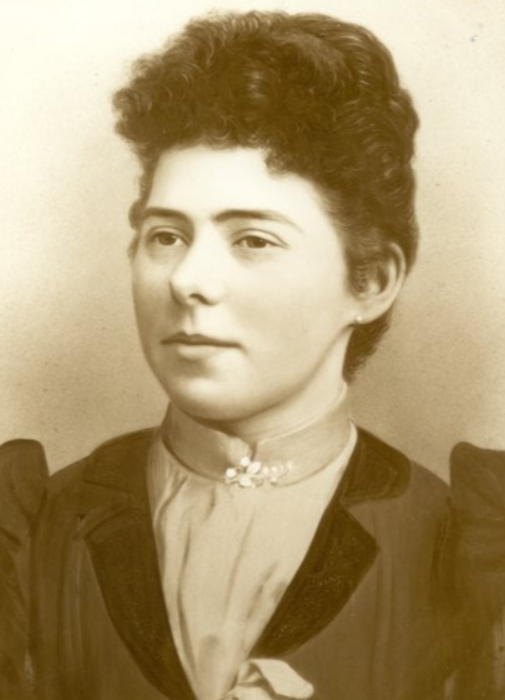
Annie, my great grandmother, was born 2 Jan 1871 in Merstow Green, Evesham, Worcestershire. Her father Fred Stokes was a wheelwright. On the 1771 census in Merston Green Annie was 3 months old and there was quite a houseful: Annies parents Fred and Rebecca, Fred’s parents Thomas and Eliza and two of their daughters, three apprentices, a lodger and one of Thomas’s grandsons.
1771 census Merstow Green, Evesham:

Annie at school in the early 1870s in Broadway. Annie is in the front on the left and her brother Fred is in the centre of the first seated row:
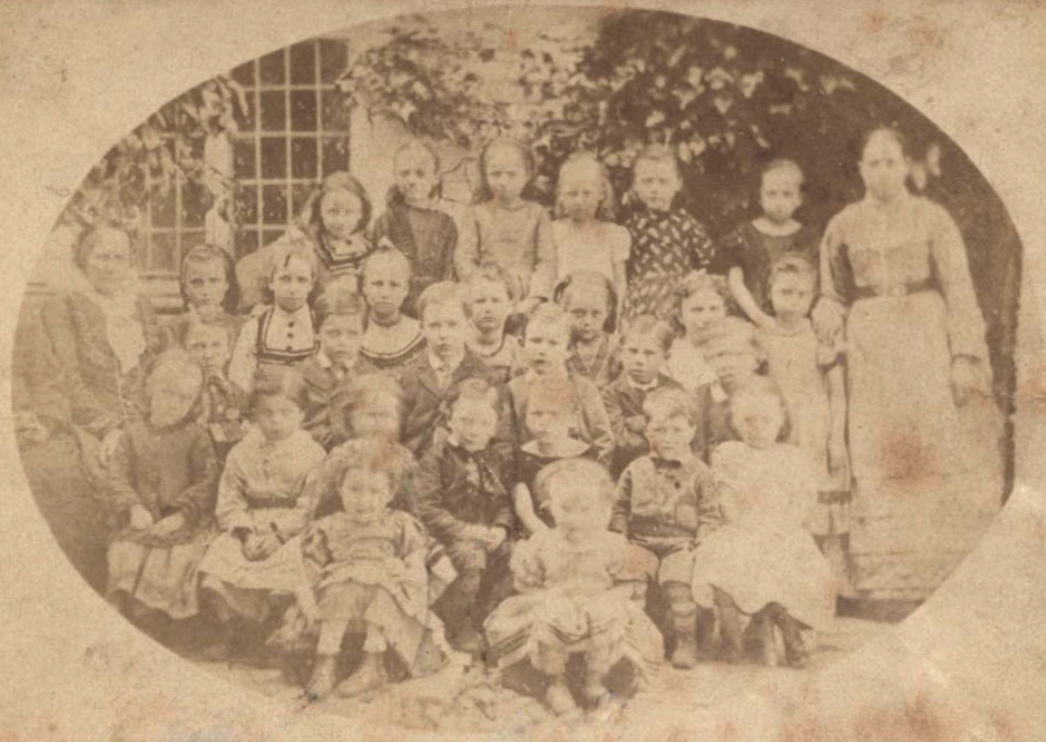
In 1881 Annie was a 10 year old visitor at the Angel Inn, Chipping Camden. A boarder there was 19 year old William Halford, a wheelwright apprentice. John Such, a 62 year old widower, was the innkeeper. Her parents and two siblings were living at La Quinta, on Main Street in Broadway.
According to her obituary in 1962, “When the Maxton family visited Broadway to stay with Mr and Madame de Navarro at Court Farm, they offered Annie a family post with them which took her for several years to Paris and other parts of the continent.”
Mary Anderson was an American theatre actress. In 1890 she married Antonio Fernando de Navarro. She became known as Mary Anderson de Navarro. They settled at Court Farm in the Cotswolds, Broadway, Worcestershire, where she cultivated an interest in music and became a noted hostess with a distinguished circle of musical, literary and ecclesiastical guests. As in the years when Mary lived there, it was often filled with visiting artists and musicians, including Myra Hess and a young Jacqueline du Pré. (via Wikipedia)
Court Farm, Broadway:
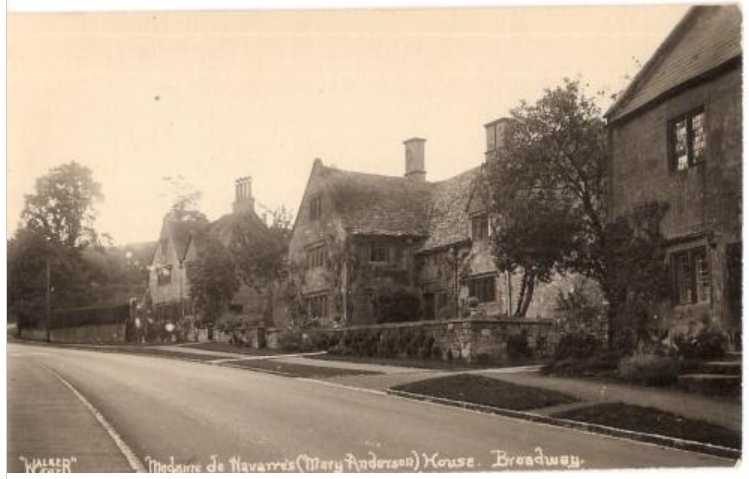
Annie was an assistant to a tobacconist in West Bromwich in 1991, living as a boarder with William Calcutt and family. He future husband Albert was living in neighbouring Tipton in 1891, working at a pawnbroker apprenticeship.
Annie married Albert Parker Edwards in 1898 in Evesham. On the 1901 census, she was in hospital in Redditch.
By 1911, Anne and Albert had five children and were living at the Cricketers Arms in Redditch.
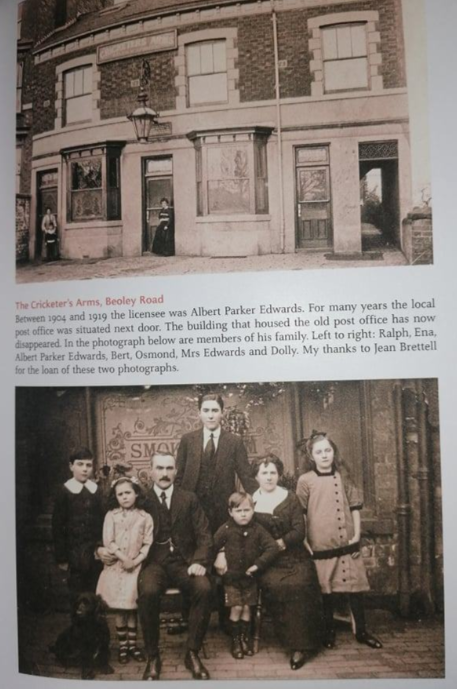
Behind the bar in 1904 shortly after taking over at the Cricketers Arms. From a book on Redditch pubs:
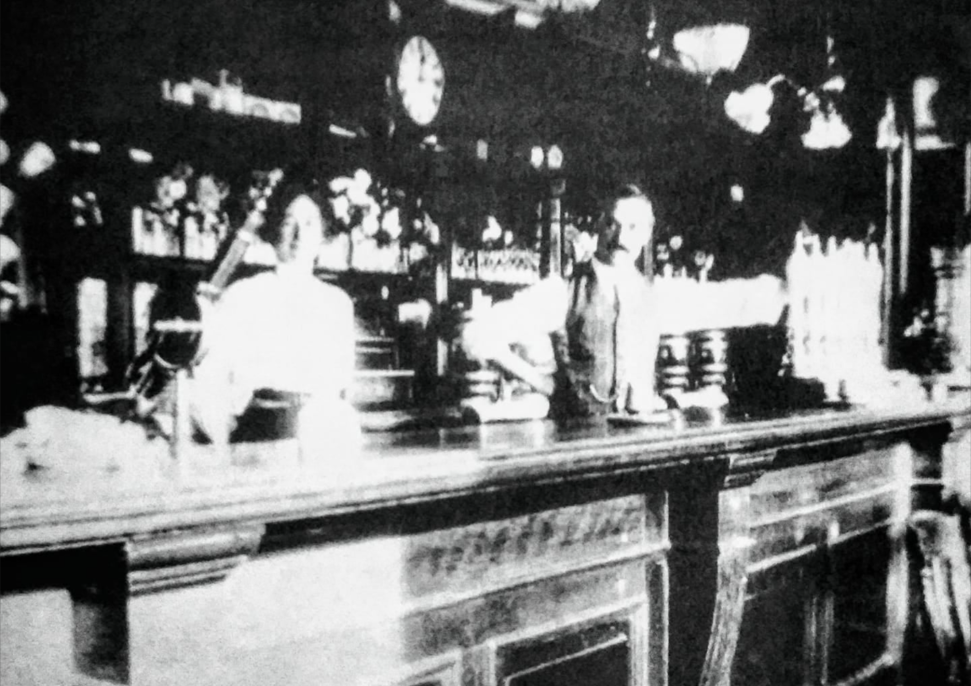
Annie was referred to in later years as Grandma E, probably to differentiate between her and my fathers Grandma T, as both lived to a great age.
Annie with her grandson Reg on the left and her daughter in law Peggy on the right, in the early 1950s:
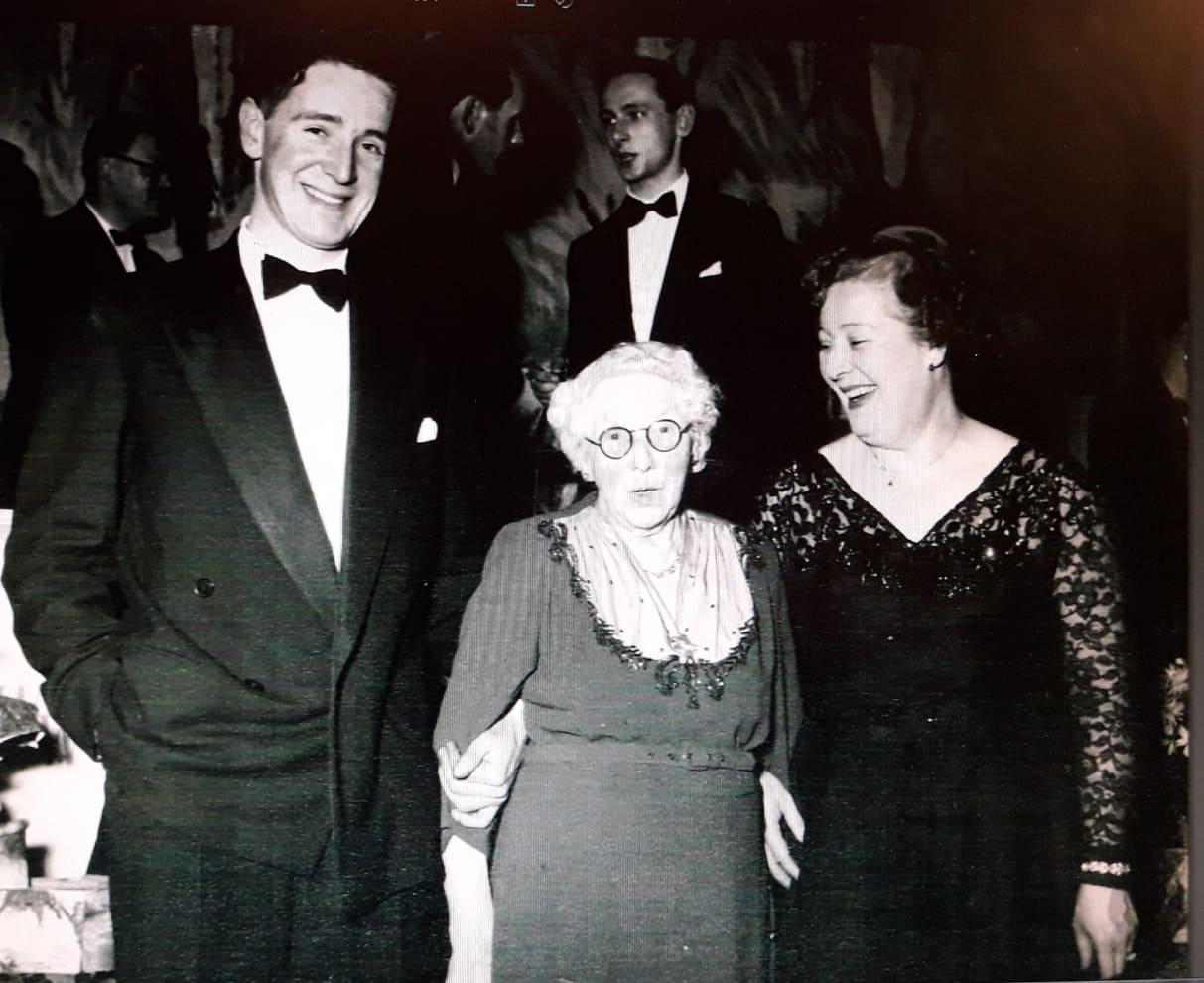
Annie at my christening in 1959:
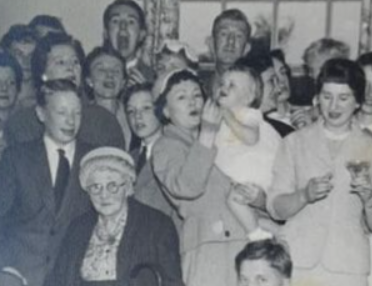
Annie died 30 Dec 1961, aged 90, at Ravenscourt nursing home, Redditch. Her obituary in the Droitwich Guardian in January 1962:
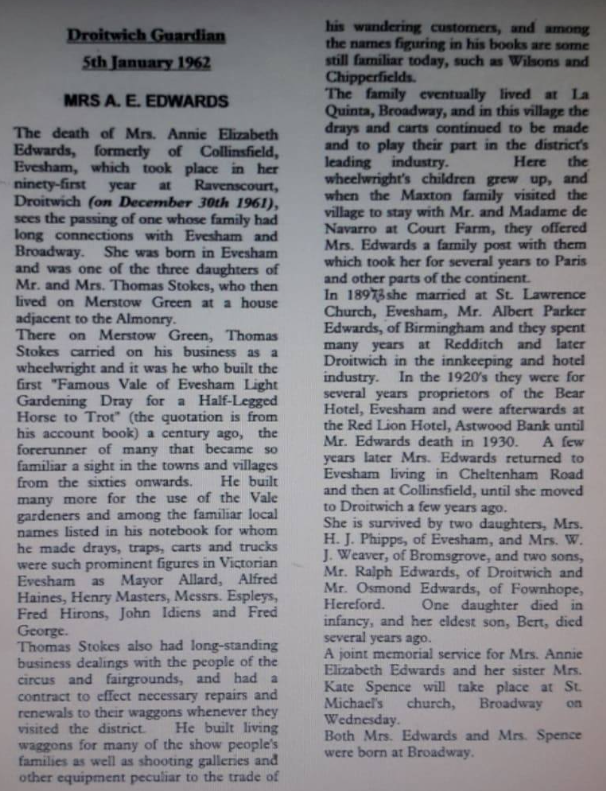
Note that this obituary contains an obvious error: Annie’s father was Frederick Stokes, and Thomas was his father.
May 3, 2022 at 4:40 pm #6291In reply to: The Elusive Samuel Housley and Other Family Stories
Jane Eaton
The Nottingham Girl
Jane Eaton 1809-1879
Francis Purdy, the Beggarlea Bulldog and Methodist Minister, married Jane Eaton in 1837 in Nottingham. Jane was his second wife.
Jane Eaton, photo says “Grandma Purdy” on the back:
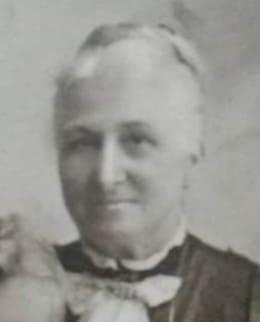
Jane is described as a “Nottingham girl” in a book excerpt sent to me by Jim Giles, a relation who shares the same 3x great grandparents, Francis and Jane Purdy.
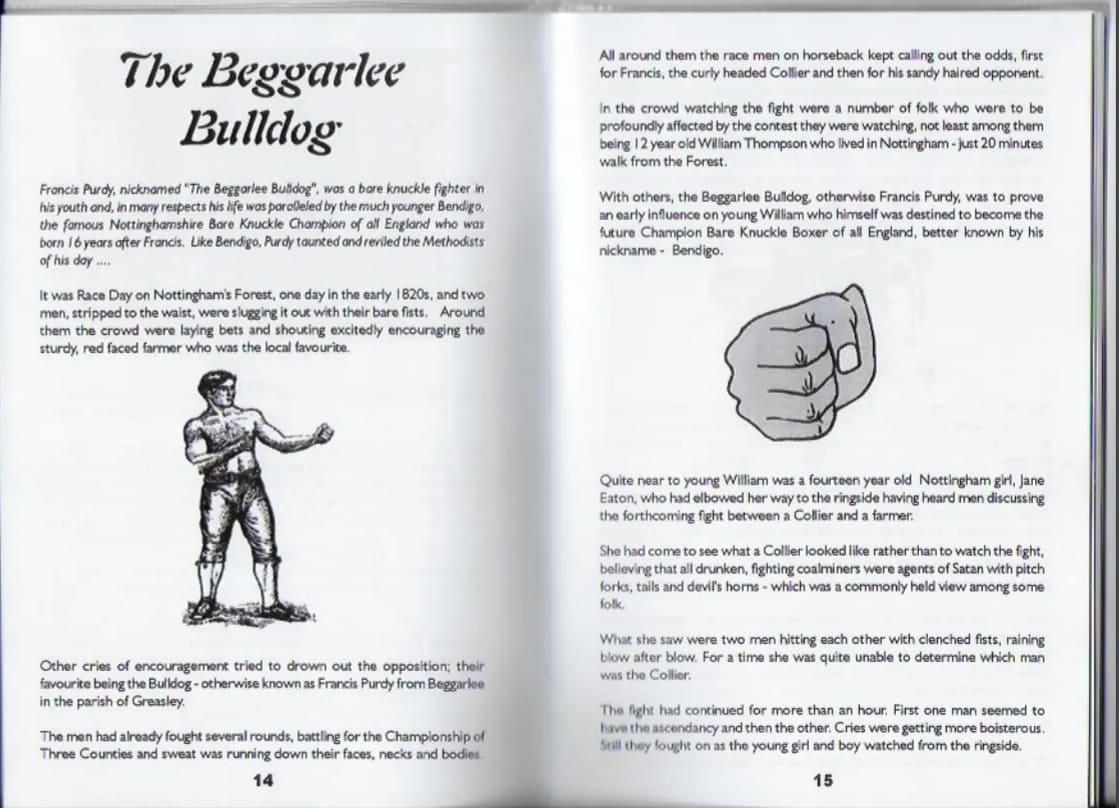
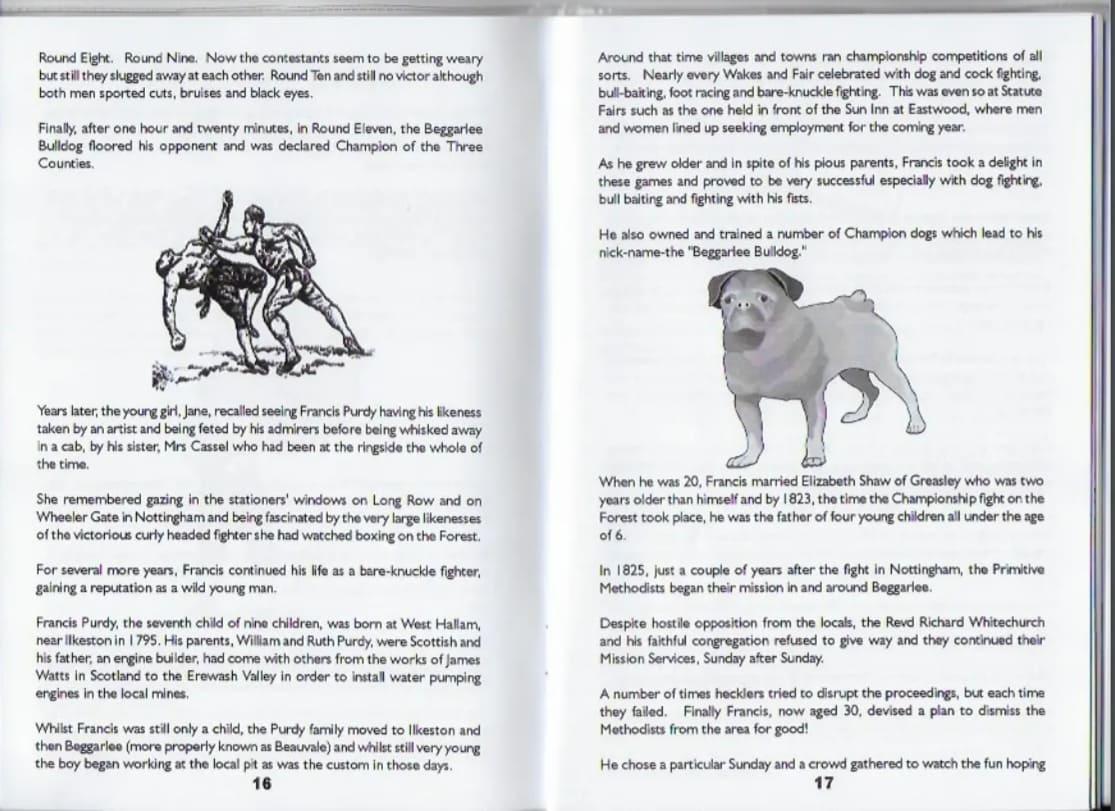
Elizabeth, Francis Purdy’s first wife, died suddenly at chapel in 1836, leaving nine children.
On Christmas day the following year Francis married Jane Eaton at St Peters church in Nottingham. Jane married a Methodist Minister, and didn’t realize she married the bare knuckle fighter she’d seen when she was fourteen until he undressed and she saw his scars.
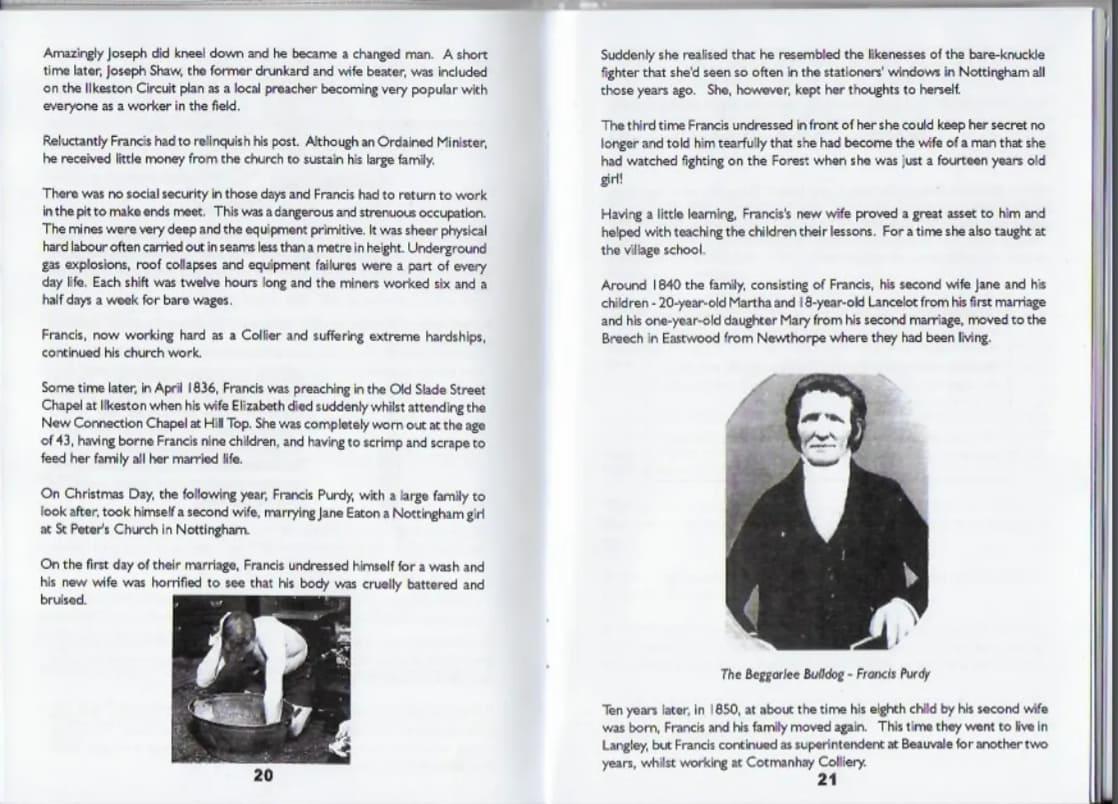
William Eaton 1767-1851
On the marriage certificate Jane’s father was William Eaton, occupation gardener. Francis’s father was William Purdy, engineer.
On the 1841 census living in Sollory’s Yard, Nottingham St Mary, William Eaton was a 70 year old gardener. It doesn’t say which county he was born in but indicates that it was not Nottinghamshire. Living with him were Mary Eaton, milliner, age 35, Mary Eaton, milliner, 15, and Elizabeth Rhodes age 35, a sempstress (another word for seamstress). The three women were born in Nottinghamshire.
But who was Elizabeth Rhodes?
Elizabeth Eaton was Jane’s older sister, born in 1797 in Nottingham. She married William Rhodes, a private in the 5th Dragoon Guards, in Leeds in October 1815.
I looked for Elizabeth Rhodes on the 1851 census, which stated that she was a widow. I was also trying to determine which William Eaton death was the right one, and found William Eaton was still living with Elizabeth in 1851 at Pilcher Gate in Nottingham, but his name had been entered backwards: Eaton William. I would not have found him on the 1851 census had I searched for Eaton as a last name.
Pilcher Gate gets its strange name from pilchers or fur dealers and was once a very narrow thoroughfare. At the lower end stood a pub called The Windmill – frequented by the notorious robber and murderer Charlie Peace.
This was a lucky find indeed, because William’s place of birth was listed as Grantham, Lincolnshire. There were a couple of other William Eaton’s born at the same time, both near to Nottingham. It was tricky to work out which was the right one, but as it turned out, neither of them were.

Now we had Nottinghamshire and Lincolnshire border straddlers, so the search moved to the Lincolnshire records.
But first, what of the two Mary Eatons living with William?William and his wife Mary had a daughter Mary in 1799 who died in 1801, and another daughter Mary Ann born in 1803. (It was common to name children after a previous infant who had died.) It seems that Mary Ann didn’t marry but had a daughter Mary Eaton born in 1822.
William and his wife Mary also had a son Richard Eaton born in 1801 in Nottingham.
Who was William Eaton’s wife Mary?
There are two possibilities: Mary Cresswell and a marriage in Nottingham in 1797, or Mary Dewey and a marriage at Grantham in 1795. If it’s Mary Cresswell, the first child Elizabeth would have been born just four or five months after the wedding. (This was far from unusual). However, no births in Grantham, or in Nottingham, were recorded for William and Mary in between 1795 and 1797.
We don’t know why William moved from Grantham to Nottingham or when he moved there. According to Dearden’s 1834 Nottingham directory, William Eaton was a “Gardener and Seedsman”.
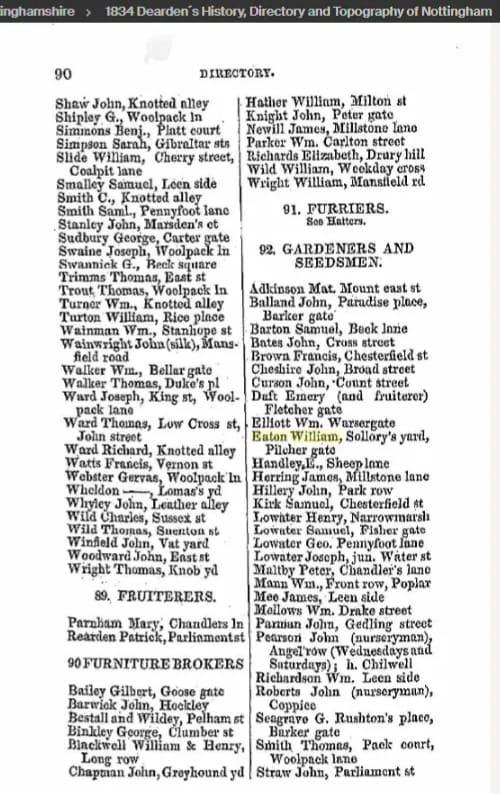
There was another William Eaton selling turnip seeds in the same part of Nottingham. At first I thought it must be the same William, but apparently not, as that William Eaton is recorded as a victualler, born in Ruddington. The turnip seeds were advertised in 1847 as being obtainable from William Eaton at the Reindeer Inn, Wheeler Gate. Perhaps he was related.
William lived in the Lace Market part of Nottingham. I wondered where a gardener would be working in that part of the city. According to CreativeQuarter website, “in addition to the trades and housing (sometimes under the same roof), there were a number of splendid mansions being built with extensive gardens and orchards. Sadly, these no longer exist as they were gradually demolished to make way for commerce…..The area around St Mary’s continued to develop as an elegant residential district during the seventeenth and eighteenth centuries, with buildings … being built for nobility and rich merchants.”
William Eaton died in Nottingham in September 1851, thankfully after the census was taken recording his place of birth.
January 20, 2022 at 9:16 am #6255In reply to: The Elusive Samuel Housley and Other Family Stories
My Grandparents
George Samuel Marshall 1903-1995
Florence Noreen Warren (Nora) 1906-1988
I always called my grandfather Mop, apparently because I couldn’t say the name Grandpa, but whatever the reason, the name stuck. My younger brother also called him Mop, but our two cousins did not.
My earliest memories of my grandparents are the picnics. Grandma and Mop loved going out in the car for a picnic. Favourite spots were the Clee Hills in Shropshire, North Wales, especially Llanbedr, Malvern, and Derbyshire, and closer to home, the caves and silver birch woods at Kinver Edge, Arley by the river Severn, or Bridgnorth, where Grandma’s sister Hildreds family lived. Stourbridge was on the western edge of the Black Country in the Midlands, so one was quickly in the countryside heading west. They went north to Derbyshire less, simply because the first part of the trip entailed driving through Wolverhampton and other built up and not particularly pleasant urban areas. I’m sure they’d have gone there more often, as they were both born in Derbyshire, if not for that initial stage of the journey.
There was predominantly grey tartan car rug in the car for picnics, and a couple of folding chairs. There were always a couple of cushions on the back seat, and I fell asleep in the back more times than I can remember, despite intending to look at the scenery. On the way home Grandma would always sing, “Show me the way to go home, I’m tired and I want to go to bed, I had a little drink about an hour ago, And it’s gone right to my head.” I’ve looked online for that song, and have not found it anywhere!
Grandma didn’t just make sandwiches for picnics, there were extra containers of lettuce, tomatoes, pickles and so on. I used to love to wash up the picnic plates in the little brook on the Clee Hills, near Cleeton St Mary. The close cropped grass was ideal for picnics, and Mop and the sheep would Baaa at each other.
Mop would base the days outting on the weather forcast, but Grandma often used to say he always chose the opposite of what was suggested. She said if you want to go to Derbyshire, tell him you want to go to Wales. I recall him often saying, on a gloomy day, Look, there’s a bit of clear sky over there. Mop always did the driving as Grandma never learned to drive. Often she’d dust the dashboard with a tissue as we drove along.
My brother and I often spent the weekend at our grandparents house, so that our parents could go out on a Saturday night. They gave us 5 shillings pocket money, which I used to spend on two Ladybird books at 2 shillings and sixpence each. We had far too many sweets while watching telly in the evening ~ in the dark, as they always turned the lights off to watch television. The lemonade and pop was Corona, and came in returnable glass bottles. We had Woodpecker cider too, even though it had a bit of an alcohol content.
Mop smoked Kensitas and Grandma smoked Sovereign cigarettes, or No6, and the packets came with coupons. They often let me choose something for myself out of the catalogue when there were enough coupons saved up.
When I had my first garden, in a rented house a short walk from theirs, they took me to garden nurseries and taught me all about gardening. In their garden they had berberis across the front of the house under the window, and cotoneaster all along the side of the garage wall. The silver birth tree on the lawn had been purloined as a sapling from Kinver edge, when they first moved into the house. (they lived in that house on Park Road for more than 60 years). There were perennials and flowering shrubs along the sides of the back garden, and behind the silver birch, and behind that was the vegeatable garden. Right at the back was an Anderson shelter turned into a shed, the rhubarb, and the washing line, and the canes for the runner beans in front of those. There was a little rose covered arch on the path on the left, and privet hedges all around the perimeter.
My grandfather was a dental technician. He worked for various dentists on their premises over the years, but he always had a little workshop of his own at the back of his garage. His garage was full to the brim of anything that might potentially useful, but it was not chaotic. He knew exactly where to find anything, from the tiniest screw for spectacles to a useful bit of wire. He was “mechanicaly minded” and could always fix things like sewing machines and cars and so on.
Mop used to let me sit with him in his workshop, and make things out of the pink wax he used for gums to embed the false teeth into prior to making the plaster casts. The porcelain teeth came on cards, and were strung in place by means of little holes on the back end of the teeth. I still have a necklace I made by threading teeth onto a string. There was a foot pedal operated drill in there as well, possibly it was a dentists drill previously, that he used with miniature grinding or polishing attachments. Sometimes I made things out of the pink acrylic used for the final denture, which had a strong smell and used to harden quickly, so you had to work fast. Initially, the workshop was to do the work for Uncle Ralph, Grandmas’s sisters husband, who was a dentist. In later years after Ralph retired, I recall a nice man called Claude used to come in the evening to collect the dentures for another dental laboratory. Mop always called his place of work the laboratory.
Grandma loved books and was always reading, in her armchair next to the gas fire. I don’t recall seeing Mop reading a book, but he was amazingly well informed about countless topics.
At family gatherings, Mops favourite topic of conversation after dinner was the atrocities committed over the centuries by organized religion.My grandfather played snooker in his younger years at the Conservative club. I recall my father assuming he voted Conservative, and Mop told him in no uncertain terms that he’s always voted Labour. When asked why he played snooker at the Conservative club and not the Labour club, he said with a grin that “it was a better class of people”, but that he’d never vote Conservative because it was of no benefit to the likes of us working people.
Grandma and her sister in law Marie had a little grocers shop on Brettel Lane in Amblecote for a few years but I have no personal recollection of that as it was during the years we lived in USA. I don’t recall her working other than that. She had a pastry making day once a week, and made Bakewell tart, apple pie, a meat pie, and her own style of pizza. She had an old black hand operated sewing machine, and made curtains and loose covers for the chairs and sofa, but I don’t think she made her own clothes, at least not in later years. I have her sewing machine here in Spain.
At regular intervals she’d move all the furniture around and change the front room into the living room and the back into the dining room and vice versa. In later years Mop always had the back bedroom (although when I lived with them aged 14, I had the back bedroom, and painted the entire room including the ceiling purple). He had a very lumpy mattress but he said it fit his bad hip perfectly.Grandma used to alternate between the tiny bedroom and the big bedroom at the front. (this is in later years, obviously) The wardrobes and chests of drawers never changed, they were oak and substantial, but rather dated in appearance. They had a grandfather clock with a brass face and a grandmother clock. Over the fireplace in the living room was a Utrillo print. The bathroom and lavatory were separate rooms, and the old claw foot bath had wood panels around it to make it look more modern. There was a big hot water geyser above it. Grandma was fond of using stick on Fablon tile effects to try to improve and update the appearance of the bathroom and kitchen. Mop was a generous man, but would not replace household items that continued to function perfectly well. There were electric heaters in all the rooms, of varying designs, and gas fires in living room and dining room. The coal house on the outside wall was later turned into a downstairs shower room, when Mop moved his bedroom downstairs into the front dining room, after Grandma had died and he was getting on.

Mop was 91 when he told me he wouldn’t be growing any vegetables that year. He said the sad thing was that he knew he’d never grow vegetables again. He worked part time until he was in his early 80s.
January 15, 2022 at 6:54 pm #6254In reply to: The Elusive Samuel Housley and Other Family Stories
The Gladstone Connection
My grandmother had said that we were distantly related to Gladstone the prime minister. Apparently Grandma’s mothers aunt had a neice that was related to him, or some combination of aunts and nieces on the Gretton side. I had not yet explored all the potential great grandmothers aunt’s nieces looking for this Gladstone connection, but I accidentally found a Gladstone on the tree on the Gretton side.
I was wandering around randomly looking at the hints for other people that had my grandparents in their trees to see who they were and how they were connected, and noted a couple of photos of Orgills. Richard Gretton, grandma’s mother Florence Nightingale Gretton’s father, married Sarah Orgill. Sarah’s brother John Orgill married Elizabeth Mary Gladstone. It was the photographs that caught my eye, but then I saw the Gladstone name, and that she was born in Liverpool. Her father was William Gladstone born 1809 in Liverpool, just like the prime minister. And his father was John Gladstone, just like the prime minister.
But the William Gladstone in our family tree was a millwright, who emigrated to Australia with his wife and two children rather late in life at the age of 54, in 1863. He died three years later when he was thrown out of a cart in 1866. This was clearly not William Gladstone the prime minister.
John Orgill emigrated to Australia in 1865, and married Elizabeth Mary Gladstone in Victoria in 1870. Their first child was born in December that year, in Dandenong. Their three sons all have the middle name Gladstone.
John Orgill 1835-1911 (Florence Nightingale Gretton’s mothers brother)

Elizabeth Mary Gladstone 1845-1926

I did not think that the link to Gladstone the prime minister was true, until I found an article in the Australian newspapers while researching the family of John Orgill for the Australia chapter.
In the Letters to the Editor in The Argus, a Melbourne newspaper, dated 8 November 1921:

THE GLADSTONE FAMILY.
TO THE EDITOR OF THE ARGUS.
Sir,—I notice to-day a reference to the
death of Mr. Robert Gladstone, late of
Wooltonvale. Liverpool, who, together
with estate in England valued at £143,079,
is reported to have left to his children
(five sons and seven daughters) estate
valued at £4,300 in Victoria. It may be
of interest to some of your readers to
know that this Robert Gladstone was a
son of the Gladstone family to which
the Right Hon. W. E. Gladstone, the
famous Prime Minister, belonged, some
members of which are now resident in Aus-
tralia. Robert Gladstone’s father (W. E.
Gladstone’s cousin), Stuart Gladstone, of
Liverpool, owned at one time the estates
of Noorat and Glenormiston, in Victoria,
to which he sent Neil Black as manager.
Mr. Black, who afterwards acquired the
property, called one of his sons “Stuart
Gladstone” after his employer. A nephew
of Stuart Gladstone (and cousin of
Robert Gladstone, of Wooltonvale), Robert
Cottingham, by name “Bobbie” came out
to Australia to farm at Noorat, but was
killed in a horse accident when only 21,
and was the first to be buried in the new
cemetery at Noorat. A brother, of “Bob-
bie,” “Fred” by name, was well known
in the early eighties as an overland
drover, taking stock for C. B. Fisher to
the far north. Later on he married and
settled in Melbourne, but left during the
depressing time following the bursting of
the boom, to return to Queensland, where,
in all probability, he still resides. A sister
of “Bobbie” and “Fred” still lives in the
neighbourhood of Melbourne. Their
father, Montgomery Gladstone, who was in
the diplomatic service, and travelled about
a great deal, was a brother of Stuart Glad-
stone, the owner of Noorat, and a full
cousin of William Ewart Gladstone, his
father, Robert, being a brother of W. E.
Gladstone’s father, Sir John, of Liverpool.
The wife of Robert Gladstone, of Woolton-
vale, Ella Gladstone by name, was also
his second cousin, being the daughter of
Robertson Gladstone, of Courthaize, near
Liverpool, W. E. Gladstone’s older
brother.
A cousin of Sir John Gladstone
(W. E. G.’s father), also called John, was
a foundry owner in Castledouglas, and the
inventor of the first suspension bridge, a
model of which was made use of in the
erection of the Menai Bridge connecting
Anglesea with the mainland, and was after-
wards presented to the Liverpool Stock
Exchange by the inventor’s cousin, Sir
John. One of the sons of this inventive
engineer, William by name, left England
in 1863 with his wife and son and daugh-
ter, intending to settle in New Zealand,
but owing to the unrest caused there by
the Maori war, he came instead to Vic-
toria, and bought land near Dandenong.
Three years later he was killed in a horse
accident, but his name is perpetuated in
the name “Gladstone road” in Dandenong.
His daughter afterwards married, and lived
for many years in Gladstone House, Dande-
nong, but is now widowed and settled in
Gippsland. Her three sons and four daugh-
ters are all married and perpetuating the
Gladstone family in different parts of Aus-
tralia. William’s son (also called Wil-
liam), who came out with his father,
mother, and sister in 1863 still lives in the
Fix this textneighbourhood of Melbourne, with his son
and grandson. An aunt of Sir John Glad-
stone (W. E. G.’s father), Christina Glad-
stone by name, married a Mr. Somerville,
of Biggar. One of her great-grandchildren
is Professor W. P. Paterson, of Edinburgh
University, another is a professor in the
West Australian University, and a third
resides in Melbourne. Yours. &c.Melbourne, Nov.7, FAMILY TREE
According to the Old Dandenong website:
“Elizabeth Mary Orgill (nee Gladstone) operated Gladstone House until at least 1911, along with another hydropathic hospital (Birthwood) on Cheltenham road. She was the daughter of William Gladstone (Nephew of William Ewart Gladstone, UK prime minister in 1874).”
The story of the Orgill’s continues in the chapter on Australia.
January 14, 2022 at 3:06 pm #6253In reply to: The Elusive Samuel Housley and Other Family Stories
My Grandparents Kitchen
My grandmother used to have golden syrup in her larder, hanging on the white plastic coated storage rack that was screwed to the inside of the larder door. Mostly the larder door was left propped open with an old flat iron, so you could see the Heinz ketchup and home made picallilli (she made a particularly good picallili), the Worcester sauce and the jar of pickled onions, as you sat at the kitchen table.
If you were sitting to the right of the kitchen table you could see an assortment of mismatched crockery, cups and bowls, shoe cleaning brushes, and at the back, tiny tins of baked beans and big ones of plum tomatoes, and normal sized tins of vegetable and mushroom soup. Underneath the little shelves that housed the tins was a blue plastic washing up bowl with a few onions, some in, some out of the yellow string bag they came home from the expensive little village supermarket in.
There was much more to the left in the awkward triangular shape under the stairs, but you couldn’t see under there from your seat at the kitchen table. You could see the shelf above the larder door which held an ugly china teapot of graceless modern lines, gazed with metallic silver which was wearing off in places. Beside the teapot sat a serving bowl, squat and shapely with little handles, like a flattened Greek urn, in white and reddish brown with flecks of faded gilt. A plain white teapot completed the trio, a large cylindrical one with neat vertical ridges and grooves.
There were two fridges under the high shallow wooden wall cupboard. A waist high bulbous old green one with a big handle that pulled out with a clunk, and a chest high sleek white one with a small freezer at the top with a door of its own. On the top of the fridges were biscuit and cracker tins, big black keys, pencils and brittle yellow notepads, rubber bands and aspirin value packs and a bottle of Brufen. There was a battered old maroon spectacle case and a whicker letter rack, letters crammed in and fanning over the top. There was always a pile of glossy advertising pamphlets and flyers on top of the fridges, of the sort that were best put straight into the tiny pedal bin.
My grandmother never lined the pedal bin with a used plastic bag, nor with a specially designed plastic bin liner. The bin was so small that the flip top lid was often gaping, resting on a mound of cauliflower greens and soup tins. Behind the pedal bin, but on the outer aspect of the kitchen wall, was the big black dustbin with the rubbery lid. More often than not, the lid was thrust upwards. If Thursday when the dustbin men came was several days away, you’d wish you hadn’t put those newspapers in, or those old shoes! You stood in the softly drizzling rain in your slippers, the rubbery sheild of a lid in your left hand and the overflowing pedal bin in the other. The contents of the pedal bin are not going to fit into the dustbin. You sigh, put the pedal bin and the dustbin lid down, and roll up your sleeves ~ carefully, because you’ve poked your fingers into a porridge covered teabag. You grab the sides of the protruding black sack and heave. All being well, the contents should settle and you should have several inches more of plastic bag above the rim of the dustbin. Unless of course it’s a poor quality plastic bag in which case your fingernail will go through and a horizontal slash will appear just below rubbish level. Eventually you upend the pedal bin and scrape the cigarette ash covered potato peelings into the dustbin with your fingers. By now the fibres of your Shetland wool jumper are heavy with damp, just like the fuzzy split ends that curl round your pale frowning brow. You may push back your hair with your forearm causing the moisture to bead and trickle down your face, as you turn the brass doorknob with your palm and wrist, tea leaves and cigarette ash clinging unpleasantly to your fingers.
The pedal bin needs rinsing in the kitchen sink, but the sink is full of mismatched saucepans, some new in shades of harvest gold, some battered and mishapen in stainless steel and aluminium, bits of mashed potato stuck to them like concrete pebbledash. There is a pale pink octagonally ovoid shallow serving dish and a little grey soup bowl with a handle like a miniature pottery saucepan decorated with kitcheny motifs.
The water for the coffee bubbles in a suacepan on the cream enamelled gas cooker. My grandmother never used a kettle, although I do remember a heavy flame orange one. The little pan for boiling water had a lip for easy pouring and a black plastic handle.
The steam has caused the condensation on the window over the sink to race in rivulets down to the fablon coated windowsill. The yellow gingham curtains hang limply, the left one tucked behind the back of the cooker.
You put the pedal bin back it it’s place below the tea towel holder, and rinse your mucky fingers under the tap. The gas water heater on the wall above you roars into life just as you turn the tap off, and disappointed, subsides.
As you lean over to turn the cooker knob, the heat from the oven warms your arm. The gas oven was almost always on, the oven door open with clean tea towels and sometimes large white pants folded over it to air.
The oven wasn’t the only heat in my grandparents kitchen. There was an electric bar fire near the red formica table which used to burn your legs. The kitchen table was extended by means of a flap at each side. When I was small I wasn’t allowed to snap the hinge underneath shut as my grandmother had pinched the skin of her palm once.
The electric fire was plugged into the same socket as the radio. The radio took a minute or two to warm up when you switched it on, a bulky thing with sharp seventies edges and a reddish wood effect veneer and big knobs. The light for my grandfathers workshop behind the garage (where he made dentures) was plugged into the same socket, which had a big heavy white three way adaptor in. The plug for the washing machine was hooked by means of a bit of string onto a nail or hook so that it didn’t fall down behing the washing machine when it wasn’t plugged in. Everything was unplugged when it wasn’t in use. Sometimes there was a shrivelled Christmas cactus on top of the radio, but it couldn’t hide the adaptor and all those plugs.
Above the washing machine was a rhomboid wooden wall cupboard with sliding frsoted glass doors. It was painted creamy gold, the colour of a nicotine stained pub ceiling, and held packets of Paxo stuffing and little jars of Bovril and Marmite, packets of Bisto and a jar of improbably red Maraschino cherries.
The nicotine coloured cupboard on the opposite wall had half a dozen large hooks screwed under the bottom shelf. A variety of mugs and cups hung there when they weren’t in the bowl waiting to be washed up. Those cupboard doors seemed flimsy for their size, and the thin beading on the edge of one door had come unstuck at the bottom and snapped back if you caught it with your sleeve. The doors fastened with a little click in the centre, and the bottom of the door reverberated slightly as you yanked it open. There were always crumbs in the cupboard from the numerous packets of bisucits and crackers and there was always an Allbran packet with the top folded over to squeeze it onto the shelf. The sugar bowl was in there, sticky grains like sandpaper among the biscuit crumbs.
Half of one of the shelves was devoted to medicines: grave looking bottles of codeine linctus with no nonsense labels, brown glass bottles with pills for rheumatism and angina. Often you would find a large bottle, nearly full, of Brewers yeast or vitamin supplements with a dollar price tag, souvenirs of the familys last visit. Above the medicines you’d find a faded packet of Napolitana pasta bows or a dusty packet of muesli. My grandparents never used them but she left them in the cupboard. Perhaps the dollar price tags and foreign foods reminded her of her children.
If there had been a recent visit you would see monstrous jars of Sanka and Maxwell House coffee in there too, but they always used the coffee. They liked evaporated milk in their coffee, and used tins and tins of “evap” as they called it. They would pour it over tinned fruit, or rhubard crumble or stewed apples.
When there was just the two of them, or when I was there as well, they’d eat at the kitchen table. The table would be covered in a white embroidered cloth and the food served in mismatched serving dishes. The cutlery was large and bent, the knife handles in varying shades of bone. My grandfathers favourite fork had the tip of each prong bent in a different direction. He reckoned it was more efficient that way to spear his meat. He often used to chew his meat and then spit it out onto the side of his plate. Not in company, of course. I can understand why he did that, not having eaten meat myself for so long. You could chew a piece of meat for several hours and still have a stringy lump between your cheek and your teeth.
My grandfather would always have a bowl of Allbran with some Froment wheat germ for his breakfast, while reading the Daily Mail at the kitchen table. He never worse slippers, always shoes indoors, and always wore a tie. He had lots of ties but always wore a plain maroon one. His shirts were always cream and buttoned at throat and cuff, and eventually started wearing shirts without detachable collars. He wore greeny grey trousers and a cardigan of the same shade most of the time, the same colour as a damp English garden.
The same colour as the slimy green wooden clothes pegs that I threw away and replaced with mauve and fuschia pink plastic ones. “They’re a bit bright for up the garden, aren’t they,” he said. He was right. I should have ignored the green peg stains on the laundry. An English garden should be shades of moss and grassy green, rich umber soil and brick red walls weighed down with an atmosphere of dense and heavy greyish white.
After Grandma died and Mop had retired (I always called him Mop, nobody knows why) at 10:00am precisely Mop would have a cup of instant coffee with evap. At lunch, a bowl of tinned vegetable soup in his special soup bowl, and a couple of Krackawheat crackers and a lump of mature Cheddar. It was a job these days to find a tasty cheddar, he’d say.
When he was working, and he worked until well into his seventies, he took sandwiches. Every day he had the same sandwich filling: a combination of cheese, peanut butter and marmite. It was an unusal choice for an otherwise conventional man. He loved my grandmothers cooking, which wasn’t brilliant but was never awful. She was always generous with the cheese in cheese sauces and the meat in meat pies. She overcooked the cauliflower, but everyone did then. She made her gravy in the roasting pan, and made onion sauce, bread sauce, parsley sauce and chestnut stuffing. She had her own version of cosmopolitan favourites, and called her quiche a quiche when everyone was still calling it egg and bacon pie. She used to like Auntie Daphne’s ratatouille, rather exotic back then, and pronounced it Ratta Twa. She made pizza unlike any other, with shortcrust pastry smeared with tomato puree from a tube, sprinkled with oregano and great slabs of cheddar.
The roast was always overdone. “We like our meat well done” she’d say. She’d walk up the garden to get fresh mint for the mint sauce and would announce with pride “these runner beans are out of the garding”. They always grew vegetables at the top of the garden, behind the lawn and the silver birch tree. There was always a pudding: a slice of almond tart (always with home made pastry), a crumble or stewed fruit. Topped with evap, of course.
December 16, 2021 at 1:51 pm #6240In reply to: The Elusive Samuel Housley and Other Family Stories
Phyllis Ellen Marshall
1909 – 1983

Phyllis, my grandfather George Marshall’s sister, never married. She lived in her parents home in Love Lane, and spent decades of her later life bedridden, living alone and crippled with rheumatoid arthritis. She had her bed in the front downstairs room, and had cords hanging by her bed to open the curtains, turn on the tv and so on, and she had carers and meals on wheels visit her daily. The room was dark and grim, but Phyllis was always smiling and cheerful. Phyllis loved the Degas ballerinas and had a couple of prints on the walls.
I remember visiting her, but it has only recently registered that this was my great grandparents house. When I was a child, we visited her and she indicated a tin on a chest of drawers and said I could take a biscuit. It was a lemon puff, and was the stalest biscuit I’d ever had. To be polite I ate it. Then she offered me another one! I declined, but she thought I was being polite and said “Go on! You can have another!” I ate another one, and have never eaten a lemon puff since that day.
Phyllis’s nephew Bryan Marshall used to visit her regularly. I didn’t realize how close they were until recently, when I resumed contact with Bryan, who emigrated to USA in the 1970s following a successful application for a job selling stained glass windows and church furnishings.
I asked on a Stourbridge facebook group if anyone remembered her.
AF Yes I remember her. My friend and I used to go up from Longlands school every Friday afternoon to do jobs for her. I remember she had a record player and we used to put her 45rpm record on Send in the Clowns for her. Such a lovely lady. She had her bed in the front room.
KW I remember very clearly a lady in a small house in Love Lane with alley at the left hand. I was intrigued by this lady who used to sit with the front door open and she was in a large chair of some sort. I used to see people going in and out and the lady was smiling. I was young then (31) and wondered how she coped but my sense was she had lots of help. I’ve never forgotten that lady in Love Lane sitting in the open door way I suppose when it was warm enough.
LR I used to deliver meals on wheels to her lovely lady.
I sent Bryan the comments from the Stourbridge group and he replied:
Thanks Tracy. I don’t recognize the names here but lovely to see such kind comments.
In the early 70’s neighbors on Corser Street, Mr. & Mrs. Walter Braithwaite would pop around with occasional visits and meals. Walter was my piano teacher for awhile when I was in my early twenties. He was a well known music teacher at Rudolph Steiner School (former Elmfield School) on Love Lane. A very fine school. I seem to recall seeing a good article on Walter recently…perhaps on the Stourbridge News website. He was very well known.
I’m ruminating about life with my Aunt Phyllis. We were very close. Our extra special time was every Saturday at 5pm (I seem to recall) we’d watch Doctor Who. Right from the first episode. We loved it. Likewise I’d do the children’s crossword out of Woman’s Realm magazine…always looking to win a camera but never did ! She opened my mind to the Bible, music and ballet. She once got tickets and had a taxi take us into Birmingham to see the Bolshoi Ballet…at a time when they rarely left their country. It was a very big deal in the early 60’s. ! I’ve many fond memories about her and grandad which I’ll share in due course. I’d change the steel needle on the old record player, following each play of the 78rpm records…oh my…another world.Bryan continues reminiscing about Phyllis in further correspondence:
Yes, I can recall those two Degas prints. I don’t know much of Phyllis’ early history other than she was a hairdresser in Birmingham. I want to say at John Lewis, for some reason (so there must have been a connection and being such a large store I bet they did have a salon?)
You will know that she had severe and debilitating rheumatoid arthritis that eventually gnarled her hands and moved through her body. I remember strapping on her leg/foot braces and hearing her writhe in pain as I did so but she wanted to continue walking standing/ getting up as long as she could. I’d take her out in the wheelchair and I can’t believe I say it along …but down Stanley Road!! (I had subsequent nightmares about what could have happened to her, had I tripped or let go!) She loved Mary Stevens Park, the swans, ducks and of course Canadian geese. Was grateful for everything in creation. As I used to go over Hanbury Hill on my visit to Love Lane, she would always remind me to smell the “sea-air” as I crested the hill.
In the earlier days she smoked cigarettes with one of those long filters…looking like someone from the twenties.I’ll check on “Send in the clowns”. I do recall that music. I remember also she loved to hear Neil Diamond. Her favorites in classical music gave me an appreciation of Elgar and Delius especially. She also loved ballet music such as Swan Lake and Nutcracker. Scheherazade and La Boutique Fantastic also other gems.
When grandad died she and aunt Dorothy shared more about grandma (who died I believe when John and I were nine-months old…therefore early 1951). Grandma (Mary Ann Gilman Purdy) played the piano and loved Strauss and Offenbach. The piano in the picture you sent had a bad (wonky) leg which would fall off and when we had the piano at 4, Mount Road it was rather dangerous. In any event my parents didn’t want me or others “banging on it” for fear of waking the younger brothers so it disappeared at sometime.
By the way, the dog, Flossy was always so rambunctious (of course, she was a JRT!) she was put on the stairway which fortunately had a door on it. Having said that I’ve always loved dogs so was very excited to see her and disappointed when she was not around.Phyllis with her parents William and Mary Marshall, and Flossie the dog in the garden at Love Lane:

Bryan continues:
I’ll always remember the early days with the outside toilet with the overhead cistern caked in active BIG spider webs. I used to have to light a candle to go outside, shielding the flame until destination. In that space I’d set the candle down and watch the eery shadows move from side to side whilst…well anyway! Then I’d run like hell back into the house. Eventually the kitchen wall was broken through so it became an indoor loo. Phew!
In the early days the house was rented for ten-shillings a week…I know because I used to take over a ten-bob-note to a grumpy lady next door who used to sign the receipt in the rent book. Then, I think she died and it became available for $600.00 yes…the whole house for $600.00 but it wasn’t purchased then. Eventually aunt Phyllis purchased it some years later…perhaps when grandad died.I used to work much in the back garden which was a lovely walled garden with arch-type decorations in the brickwork and semicircular shaped capping bricks. The abundant apple tree. Raspberry and loganberry canes. A gooseberry bush and huge Victoria plum tree on the wall at the bottom of the garden which became a wonderful attraction for wasps! (grandad called the “whasps”). He would stew apples and fruit daily.
Do you remember their black and white cat Twinky? Always sat on the pink-screen TV and when she died they were convinced that “that’s wot got ‘er”. Grandad of course loved all his cats and as he aged, he named them all “Billy”.Have you come across the name “Featherstone” in grandma’s name. I don’t recall any details but Dorothy used to recall this. She did much searching of the family history Such a pity she didn’t hand anything on to anyone. She also said that we had a member of the family who worked with James Watt….but likewise I don’t have details.
Gifts of chocolates to Phyllis were regular and I became the recipient of the overflow!What a pity Dorothy’s family history research has disappeared! I have found the Featherstone’s, and the Purdy who worked with James Watt, but I wonder what else Dorothy knew.
I mentioned DH Lawrence to Bryan, and the connection to Eastwood, where Bryan’s grandma (and Phyllis’s mother) Mary Ann Gilman Purdy was born, and shared with him the story about Francis Purdy, the Primitive Methodist minister, and about Francis’s son William who invented the miners lamp.
He replied:
As a nosy young man I was looking through the family bookcase in Love Lane and came across a brown paper covered book. Intrigued, I found “Sons and Lovers” D.H. Lawrence. I knew it was a taboo book (in those days) as I was growing up but now I see the deeper connection. Of course! I know that Phyllis had I think an earlier boyfriend by the name of Maurice who lived in Perry Barr, Birmingham. I think he later married but was always kind enough to send her a book and fond message each birthday (Feb.12). I guess you know grandad’s birthday – July 28. We’d always celebrate those days. I’d usually be the one to go into Oldswinford and get him a cardigan or pullover and later on, his 2oz tins of St. Bruno tobacco for his pipe (I recall the room filled with smoke as he puffed away).
Dorothy and Phyllis always spoke of their ancestor’s vocation as a Minister. So glad to have this history! Wow, what a story too. The Lord rescued him from mischief indeed. Just goes to show how God can change hearts…one at a time.
So interesting to hear about the Miner’s Lamp. My vicar whilst growing up at St. John’s in Stourbridge was from Durham and each Harvest Festival, there would be a miner’s lamp placed upon the altar as a symbol of the colliery and the bountiful harvest.More recollections from Bryan about the house and garden at Love Lane:
I always recall tea around the three legged oak table bedecked with a colorful seersucker cloth. Battenburg cake. Jam Roll. Rich Tea and Digestive biscuits. Mr. Kipling’s exceedingly good cakes! Home-made jam. Loose tea from the Coronation tin cannister. The ancient mangle outside the back door and the galvanized steel wash tub with hand-operated agitator on the underside of the lid. The hand operated water pump ‘though modernisation allowed for a cold tap only inside, above the single sink and wooden draining board. A small gas stove and very little room for food preparation. Amazing how the Marshalls (×7) managed in this space!
The small window over the sink in the kitchen brought in little light since the neighbor built on a bathroom annex at the back of their house, leaving #47 with limited light, much to to upset of grandad and Phyllis. I do recall it being a gloomy place..i.e.the kitchen and back room.
The garden was lovely. Long and narrow with privet hedge dividing the properties on the right and the lovely wall on the left. Dorothy planted spectacular lilac bushes against the wall. Vivid blues, purples and whites. Double-flora. Amazing…and with stunning fragrance. Grandad loved older victorian type plants such as foxgloves and comfrey. Forget-me-nots and marigolds (calendulas) in abundance. Rhubarb stalks. Always plantings of lettuce and other vegetables. Lots of mint too! A large varigated laurel bush outside the front door!
Such a pleasant walk through the past.
An autograph book belonging to Phyllis from the 1920s has survived in which each friend painted a little picture, drew a cartoon, or wrote a verse. This entry is perhaps my favourite:
 January 5, 2021 at 9:03 pm #6175
January 5, 2021 at 9:03 pm #6175In reply to: Twists and One Return From the Time Capsule
“”Sorry, I’m only just telling you this about the note now, lovie. Your Grandma’s been on at me to tell you. Just in my thoughts I mean!” he added quickly.
Jane smirked and tapped her forehead. “Careful, Old Man. She’ll think you’ve completely lost it!”
Clara stared at him, a small frown creasing her brow. “So, the note said you were to call him?”
Bob nodded uneasily. Clara had that look on her face. The one that means she aren’t happy with the way things are proceeding.
“And then what?” asked Clara slowly.
“I dunno.” Bob shrugged. “Guess they’d bury it again? They was pretty clear they didn’t want it found. Now, how about I put the kettle on?” Bob stood quickly and began to busy himself filling the jug with water from the tap.
Clara shook her head firmly. “No.”
“No to a cup of tea?”
“No we can’t call this man.”
“I don’t know Clara. It’s getting odd it is. Strangers leaving maps in collars and whatnot. It’s not right.”
“Well, I agree it needs further investigation. But we can’t call him … not without knowing why and what’s in it.” She tapped her fingers on the table. “I’ll try and get hold of Nora again.”
December 19, 2020 at 2:04 am #6167In reply to: Twists and One Return From the Time Capsule
“Box?” said Bob placing a hand on his chest. “Not the … ”
“Not box, Grandpa. Crops.” Clara spoke loudly. Poor old Grandpa must be going a bit deaf as well—he’d gone downhill since Grandma died. “His dogs got into your garden and dug up the crops. He says he’ll come by in the morning and fix up the damage. ”
“No, need to shout, Clara. I swear you said box. I thought you meant the box in the garage.”
“Oh, no that would be awful!” Clara shuddered at the thought of anything happening to her precious treasure. “Maybe we should bring the box inside, Grandpa? Make sure it’s safe.”
Bob sighed. Last thing he wanted was the damn box inside the house. But Clara had that look on her face, the one that means she’s made up her mind. He glanced around, wondering where they could put it so it was out of the way.
“Hey!” exclaimed Clara. “Where’s VanGogh gone? Did he sneak outside when Mr Willets came.” She went to the door and peered out into the darkness. “VanGogh! Here, Boy!” she shouted. “VanGogh!”
December 5, 2020 at 6:14 pm #6154In reply to: Twists and One Return From the Time Capsule
Clara wiggled her wooly fair isle toes in front of the log fire. She was glad she’d brought her thick socks ~ the temperature had dropped and snow was forecast. Good job we got that box out before the ground froze, she said to her grandfather. He made an indecipherable harumphing noise by way of reply and asked her if she’d found out anything yet about the inscriptions.
“No,” Clara sighed, “Not a thing. I’ll probably find it when I stop looking.”
Bob raised an eyebrow and said nothing. She’d always had a funny way of looking at things. Years ago he’d come to the conclusion that he’d never really fathom how her mind worked, and he’d accepted it. Now, though, he felt a little uneasy.
“Oh look, Grandpa! How fitting! It’s the daily random quote from The Daily Wail. Listen to this: “Yesterday is history, tomorrow is a mystery, but today is a gift; that’s why it’s called The Present.” What a perfect sync!”
“Oh aye, it’s a grand sink, glad you like it! It was about time I had a new one. It was a wrench to part with the old one, after seeing your grandma standing over it for all those years, but it was half price in the sale, and I thought, why not Bob, be a devil. One last new sink before I kick the bucket. I was fed up with that bucket under the old sink, I can tell you!”
Clara blinked, and then smiled at the old man, leaning over to squeeze his arm. “It’s a great sink, Grandpa.”
July 30, 2019 at 6:18 am #4731In reply to: Pop﹡in People Tribulations
“Could you pass me the butter?” asked a strange fellow seated on Shawn Paul’s left. The man was odd, a bit looking like Captain Sparrow with his black jabot lavaliere shirt and golden earrings.
Shawn Paul felt awkward, the kind of awkwardness cultivated for many years with shyness and fear of social interactions. No wonder I wanted to be a writer, he thought. Nonetheless he handed the butter to the stranger. Could he be daring for a change and talk like his grandma always pushed him to do? The best remedy to shyness is to talk. Start by saying your name Shasha!
“My name is Shawn Paul,” he said, feeling the heat rise to his face. He gulped, unsure of what to do next. Should he talk about the morning weather?
“My name is Sanso,” said the man. “At your service,” he added waving his puffy sleeves. “Have you read the last article on _whateveralready_?
The cat behind them snorted. Shawn Paul looked at it. It looked grumpy and ready to talk.“Don’t send Mandrake any food,” said one of the other guests, a woman wearing an indian looking outfit with a scarf hiding her hair. Something moved under the head scarf and a strand of red hair ventured timidly outside, soon followed by a lizard’s head. The woman pushed it back under her hood and emitted a disgusted grunt when she saw the meat dish brought by the maid.
“I’m not a maid,” muttered Finly to whomever could hear/read her, or to the writer. “It’s good liz… chicken,” she said. No need for the long faces.”
“But it’s dead, dear,” said the woman with the veil.“The Godfrey silently prayed under the third moon,” was saying Sanso who didn’t seem to mind that Shawn Paul was not listening to him. “And he entered late inside the lake wearing a funny blue toge. Sanso realised Finly was looking at him her mouth reduced to a tight line. “And I followed with opened hope,” he finished before gulping a spoonful of butter.
“Do you happen to have a lock in your bedroom?” asked Sanso. The woman in the scarf looked at him with dark eyes. The lizard, seizing the opportunity to be free, jumped from under her scarf and landed into the gaspacho, splashing all the guests with a bit of red.
February 15, 2019 at 9:11 am #4578In reply to: The Precious Life and Rambles of Liz Tattler
“What’s the matter with you?” asked Finnley, noticing Liz looking uncharacteristically quiet and pensive. Was that a tear in her eye glistening as the morning sun slanted in the French window?
“I’ve just had a letter from one of my characters,” replied Liz. “Here, look.”
Finnley put her duster on Liz’s desk and sat in the armchair to read it.
Dear Liz, it said.
Henry appeared on the same day my young niece arrived from Sweden with her grandma. My mother had already arrived, and we’d just returned from picking them up from the airport. A black puppy was waiting outside my gate.
“We can’t leave him out here,” I said, my hands full of bags. “Grab him, Mom.”
She picked him up and carried him inside and put him down on the driveway. We went up to the house and introduced all the other dogs to the newcomers, and then we heard howling and barking. I’d forgotten to introduce the other dogs to the new puppy, so quickly went down and pulled the terrified black puppy out from under the car and picked him up. I kept him in my arms for a while and attended to the guests.
From then on he followed me everywhere. In later years when he was arthritic, he’d sigh as if to say, where is she going now, and stagger to his feet. Later still, he was very slow at following me, and I’d often bump into and nearly fall over him on the return. Or he’d lie down in the doorway so when I tripped over him, he’d know I was going somewhere. When we went for walks, before he got too old to walk much, he never needed a lead, because he was always right by my side.
When he was young he’d have savage fights with a plastic plant pot, growling at it and tossing it around. We had a game of “where’s Henry” every morning when I made the bed, and he hid under the bedclothes.
He was a greedy fat boy most of his life and adored food. He was never the biggest dog, but had an authority over any plates of leftovers on the floor by sheer greedy determination. Even when he was old and had trouble getting up, he was like a rocket if any food was dropped on the floor. Even when he had hardly any teeth left he’d shovel it up somehow, growling at the others to keep them away. The only dog he’d share with was Bill, who is a bit of a growly steam roller with food as well, despite being small.
I always wondered which dog it was that was pissing inside the house, and for years I never knew. What I would have given to know which one was doing it! I finally found out it was Henry when it was too late to do anything about it ~ by then he had bladder problems.
I started leaving him outside on the patio when we went out. One morning towards the end, in the dark, we didn’t notice him slip out of the patio gate as we were leaving. In the light from the street light outside, we saw him marching off down the road! Where was he going?! It was as if he’d packed his bags and said, That’s it, I’m off!
Eventually he died at home, sixteen years old, after staggering around on his last legs for quite some time. Stoic and stalwart were words used to describe him. He was a character.
A couple of hours before he died, I noticed something on the floor beside his head. It was a gold earring I’d never seen before, with a honeycomb design. Just after he died, Ben went and sat right next to him. We buried him under the oak tree at the bottom of the garden, and gave him a big Buddha head stone. Charlie goes down there every day now. Maybe he wonders if he will be next. He pisses on the Buddha head. Maybe he’s paying his respects, but maybe he’s just doing what dogs do.
March 28, 2016 at 9:53 am #4013In reply to: Mandala of Ascensions
Edward Cayper had been absorbed on the mesmerizing display of the large monitoring screens. He’d liked to believe it was a meditation of sorts. The simulation made the most tantalizing displays, ever changing.
Although there had been flitches. Increasingly. He called them flitches, scratchy flea-like glitches, all small and jumpy, but he had an eye for them. He was, after all, one of the early designers of the Program. REYE – Reality Emergence Yielding Existence. That didn’t mean much, but sounded cool at the time.
REYE was in its eighth stable upgrade. Despite the flitches, it had evolved at exponential speed.Edward swiveled from his chair to look behind his desk. A series of pods was lined up with sensory deprivation tanks hosting hundreds of plugged-in bodies dreaming in synch with his creation.
He’d been told they were volunteers to participate in the largest mind control experiment in the world. He wasn’t sure it wasn’t a lie, but didn’t care so much.
REYE was in charge of coordinating the whole program with astronomical and minute precision. Each person linked to the program believed they had become ascended (or something similarly close to their metaphysical belief). Free of the bonding of space, time and corporal existence, they were taught into a very subtle and complex system of attunement to higher truths. A large basket of bollocks of course, but while they were doing it, and deeply believing it to be real, the mind-energy they produced was redirected to certain mind control experiments.Since they started in the 80s, the program had had slow progress. In the beginning, only a few sprouts of channellers appeared near their area, in Nevada. They were quite timid at first, full of doubts about their hearing or seeing voices – still better than the abductions of earlier, when many went completely nuts. But now, progresses were made steadily, and with much less effort. Edward personally believed that the network of waves created by cellphone proliferation had a factor in this trend. Such interconnexion made everything easier.
Within the program, the flitchy Ascended Masters still had to be reconditioned from time to time. On the vitals of Jane Pierce (a.a.a. “also avatared as” Dispersee within the program), Edward could see there were occasional resistance and stress, which in turn made the glitches more frequent. A change in her drugs dosage would do fine to level the serotonin in her bloodstream. It would be that, or unplugging her.
Before leaving the room, like every day, Edward switched the monitor to the camera over one of the pods. Florence Vengard (a.a.a. Floverley), was dreaming peacefully, as usual. Since she’d arrived, he’d felt connected to her. He imagined her with long curly red hair floating in the milk bath instead of the bath-cap that made the maintenance so much easier. He was told she had overdosed on pills, and wouldn’t wake up. The program seemed to be tethering her to life, frozen in time.
A well-oiled machine.
If you overlooked the small things… that REYE was becoming more inquisitive, and Edward suspected, greedy too. He had seen subtle gaps in the mind-energy gauges, it couldn’t be a coincidence. The program was becoming too smart, maybe too human.It couldn’t bode well.
June 14, 2009 at 1:10 am #2249In reply to: The Eights’ Shift, Stories
Now, now Lavvie dear, you know I detest hugging. Grandma Heliotrope extricated herself from Lavender’s embrace. It is so bohemian. If you wish to show me affection then a smile will suffice. A cup of hot vegemite would not go amiss either. Then I have an important message from the Fellowship for you. Sadly, you really have managed to get yourself in a pickle this time my dear Lavvie.
June 13, 2009 at 3:12 am #2248In reply to: The Eights’ Shift, Stories
Grandma Heliotrope! How perfectly lovely to see you, she shouted joyfully. I thought for one awful moment you were Heliptrope!
-
AuthorSearch Results
Search Results for 'grandma'
Viewing 16 results - 1 through 16 (of 16 total)
-
Search Results
Viewing 16 results - 1 through 16 (of 16 total)